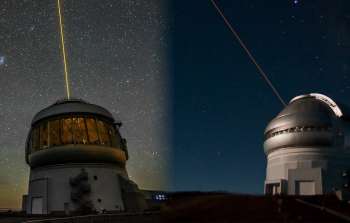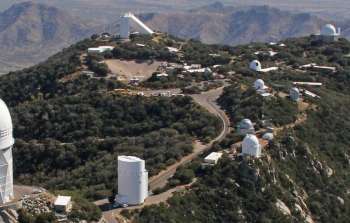sci20093 — Announcement
Scheduling of NOIRLab Programs and Status of Observing Time Lost to COVID-19 in 2020B
July 18, 2020
Gemini Observatory
Gemini North halted operations on 23 March and resumed limited nighttime operations on 19 May. The 2020B schedule for Gemini North was constructed following the usual procedures, with the exception that the planned maintenance shutdown was shortened and moved later in the semester, a result of the impact of COVID-19 on preparations for the scheduled work. Mirror recoating has been postponed to 2021. Gemini South halted operations on 16 March 2020 and remains closed. The 2020B schedule for Gemini South was also constructed following the usual procedures, except that the planned maintenance shutdown was shortened for the same reasons as in the North. Restrictions were also placed on early-semester targets, because Gemini South is not expected to be open at the start of the 2020B semester, which also coincides with the poorer weather of the Southern winter.
All uncompleted (non-ToO) Band 1 programs for 2020B that use facility instruments will rollover into the following semester, as usual for Band 1 programs. No special arrangements will be made for Band 2 and 3 programs, and these programs will come to an end when the 2020B semester closes. Target changes are not allowed, however if this would result in particular hardship (e.g., adverse effects on a student thesis), the NGO or PI should contact the Observatory and request an exception as soon as possible. Additional details are available here.
CTIO
CTIO has been closed since 18 March 2020, and 2020B programs are being scheduled following the usual procedures. The observatory will rollover time on the Blanco 4m and SOAR telescopes awarded to survey and long-term proposals by the NOIRLab TAC and by the NASA TACs (HST, Chandra, Spitzer, and FERMI) for supporting ground-based observations. Although observing time awarded to standard proposals will not be automatically rolled over, requests for DD time will receive a sympathetic ear especially when observations are time critical or form part of an investigator’s thesis research. Questions may be directed to CTIO Director Steve Heathcote (sheathcote@ctio.noao.edu).
KPNO: While KPNO has been closed since 18 March 2020, almost all of the open access time on Kitt Peak is NN-EXPLORE time on the WIYN 3.5m telescope. Due to the ongoing situation in Arizona, science operations at WIYN will not resume in 2020A. We understand this greatly affects those whose science programs have been scheduled during the latter half of the semester. Although we are not able to reschedule programs that lost time, we are investigating the possibility of allocating a small number of DD nights to time-critical programs such as thesis proposals.
The 2020B WIYN schedule is still in development and will not be finalized until we have a better understanding of when activities can resume on Kitt Peak. Instrument availability at WIYN may also be impacted by (COVID-19 induced) activity restrictions. We will reach out to PIs whose programs will be impacted if necessary. Science operations are expected to resume early in 2020B, although we plan to remain closed in August to perform routine maintenance during our monsoon season. Depending on when science operations restart, we anticipate beginning shared-risk science with NEID late in 2020B. Questions about WIYN scheduling and operations may be directed to Heidi Schweiker (heidis@noao.edu) or Jayadev Rajagopal (jrajagopal@noao.edu).
AAT
All observations have been carried out remotely since 2 June 2020. All NOIRLab programs will be scheduled following the usual procedures, and observations will need to be carried out remotely. Observers with sufficient bandwidth and some previous observing experience will be allowed to observe from home. All NOIRLab observers will be supported by local AAT support astronomers, and observers will be provided with all instructions after completing the Visitor’s Form. Questions may be directed to Lucyna Chudczer (lucyna.chudczer@astronomyaustralia.org.au) or the Siding Spring Observatory Director, Chris Lidman (Christopher.Lidman@anu.edu.au).
CHARA
With the continuation of the COVID-19 outbreak, the CHARA Array is continuing operations in remote-only mode. NOIRLab PIs who have been awarded time by the TAC are being notified and will be able to participate in their observations remotely with our staff on site. If the pandemic situation changes such that our policy can be changed to allow on-site observing, the CHARA staff will contact the PIs to discuss options. In the event that the coronavirus situation changes for the worse and the Array is forced to shut down again for the safety of the staff, we will consider options on make-up and priority resubmission of proposals for next year. At the current time, we feel that if another shutdown is necessary, we will again treat the lost time as a “poor weather event” as we do for our internal TAC programs, and request the PIs resubmit their proposals for the next semester as normal. Questions and concerns can be directed to the CHARA Director Douglas Gies (gies@chara.gsu.edu).
About the Announcement
| Id: |
ID
sci20093
|


